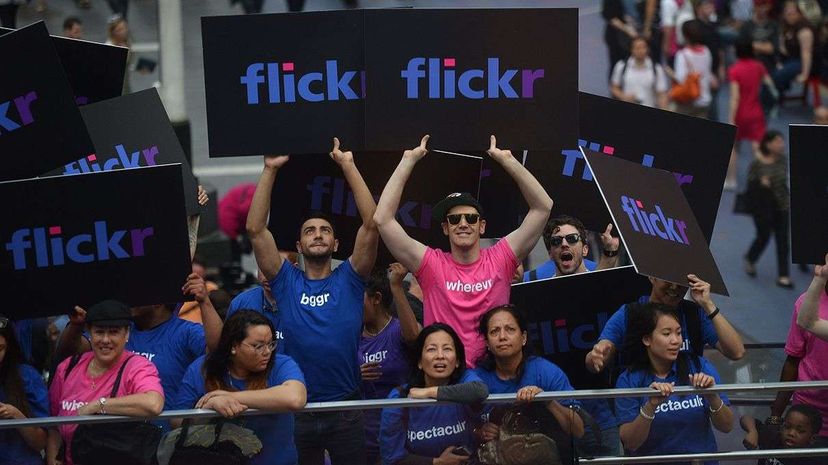 “Flickr apparently loves discarding the letter “e” so much that it took the trend to T-shirts. EMMANUEL DUNAND/AFP/Getty Images
“Flickr apparently loves discarding the letter “e” so much that it took the trend to T-shirts. EMMANUEL DUNAND/AFP/Getty Images
Creating nonsense words for brand names is not new. (Kodak and Sony mean what, exactly?) In fact, if you’re agonizing about what to name your website, here’s good news: There’s a website devoted to helping you find a nonsense word for it.
But there’s a trend in business that’s also been around for a while, and that trnd s srsly bqts. (OK, you can’t really convey "ubiquitous" without vowels.) Yup, that’s right — from Flickr to Grindr to Qzzr to Scribd, dropping vowels is obviously a way to distinguish yourself as cool. Or, more cynically, is it a way of piggybacking on the capital of another established brand to sound cool? It just may be both.
"I think the ‘vowel dropping’ in brands like Grindr, Flickr, Tumblr, and so on, is primarily about stylization (which is part of being hip)," says John Riebold, who holds a doctorate in linguistics and is a computational linguist at VoiceBox Technologies.
But Riebold believes that dropping that "e" in particular might be more than just an imitative style. He points out that the "er" — called a syllabic consonant — in words like "flicker" or "grinder" doesn’t make the vowel sound you associate with words like "ear" or "are." Instead, they’re just “r” sounds. The letters "l," "m" and "n" can also form consonant sounds that function as vowels in a syllable, as in the word "bottle."
"I think the occurrence of these brand names is due to the ‘er’ suffix being so common that even without the ‘e,’ readers know exactly how to pronounce the word," Riebold writes in an email. "The pronunciation of this suffix is always the same, and features a syllabic ‘r,’ … [so] the spelling makes intuitive sense."
So, while grouping your brand into the new, hip "e"-less market may make you look cooler, it also seems less likely to have become a trend if the words hadn’t been so easy for us to recognize, spell and pronounce. (Case in point: the wedding website BHLDN, pronounced "beholden." Not exactly intuitive, but perhaps to be expected from an American company that spells its name Anthropologie.)
But there’s one other vowel-less topic we would be remiss to overlook. "Disemvoweling" is a kind of internet punishment, where comments, posts or even articles are stripped of all vowels. It’s designed to make arguments hard to read, without resorting to outright censorship or deletion. Riebold doesn’t think the two trends are related, but acknowledges that it does have a similar way of playing on our intuitive understanding of language. "Removing all the vowels from a hate-filled tirade makes the whole message look kind of absurd, even if you know what the person is trying to say," he says.
So, when naming your next unicorn company, consider that you don’t need that "e" to get your point across. And if the domain name you want is taken, you might not be able to use it anyway.
Now That’s Interesting
It’s not just businesses that are trying to drop vowels. It’s babies too. But Riebold points out that these names — Alexsandr, Harpr, Braydn — are also all syllabic consonants. While we can gasp at them, the truth is we probably don’t have any trouble recognizing or understanding them.



























